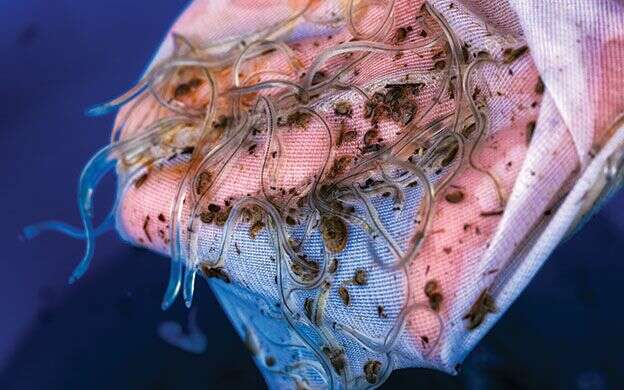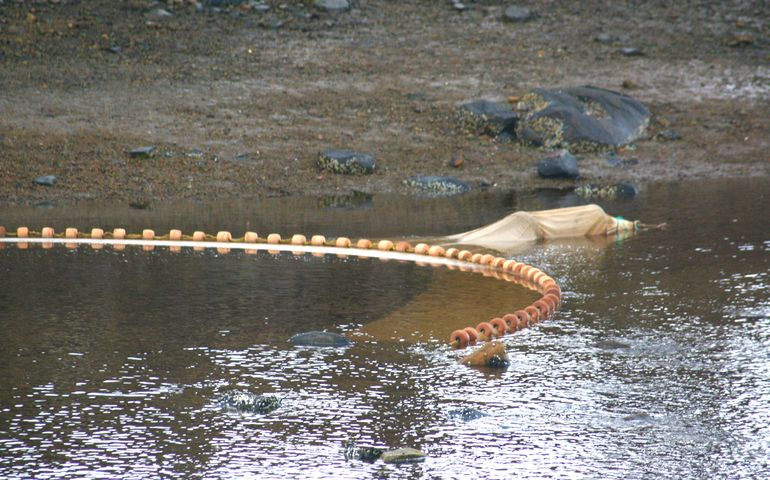
The lucrative elver season finally gets started, but prices plummet
 File photo / Laurie Schreiber
After a week-long delay while fishery regulators worked coronavirus protocols, the elver fishery started on Monday.
File photo / Laurie Schreiber
After a week-long delay while fishery regulators worked coronavirus protocols, the elver fishery started on Monday.
Maine’s elver harvest season finally got underway on Monday, after a week-long delay due to concerns about the coronavirus pandemic.
But dealers reported an average price per pound of $506, compared with prices topping $1,000 in recent years and as much as $2,000 last year, according to Department of Marine Resources data.
Elvers are baby eels that are netted along Maine’s coastal estuaries, grown to adult size and processed for the food market.
A start-up aquaculture operation in Waldoboro, American Unagi, has been growing the elvers to market size on a pilot basis over the past few years.
Maine and South Carolina are the only two states allowed to harvest elvers. Since 2014, the springtime fishery has been constrained by a quota and restrictions on the number of fishermen who can participate in the market.
So far, harvesters have collected just 46.5 pounds of the overall quota of 9,688 pounds, according to the DMR.
Crowded conditions
Several days before the March 22 start of the fishery, DMR Commissioner Patrick Keliher issued a notice that he was delaying the start due to the typically crowded conditions as harvesters congregate on the rivers and in dealer shops, and travel along the coast throughout the season.
“I know that this is devastating news to individuals who rely on this fishery,” Keliher wrote.
In a subsequent notice, he said, "The coronavirus pandemic continues to impact Maine's fisheries in ways we could not have imagined. Portions of the elver fishery make it impossible to follow social distancing recommendations, including maintaining 6 feet from other people to reduce the spread of this disease."
But last week, he issued a new notice that announced the fishery would open March 30.
The opening of the fishery came with requirements designed to minimize social contact. For the first time since the fishery came under state regulation, the order also allowed harvesters to fish for and sell the quota of another licensed harvester.

"Our objective is to reduce the population of harvesters congregating on the shores and at dealers shops," said Keliher. “Key to achieving this objective will be to allow those who are the most vulnerable to remain at home and have another harvester catch the elvers for them.”
Limiting transactions
Harvesters are expected to maintain a minimum of 6 feet of separation, spread out fishing effort on the rivers to the greatest degree possible and fish as close to home as practical, to avoid traveling throughout Maine.
Elver dealers developed and agreed on protocols for sales transactions, consistent with CDC guidelines. Those include limiting each transaction to 1 pound or more, which is expected to eliminate hundreds of smaller transactions over the course of the season and further reduce the potential to spread the virus.
The Maine Marine Patrol is monitoring the fishery to ensure participants are following protocols.
“If I become aware that participants are not following protocols designed to keep all residents of the state of Maine safe, the fishery will be closed,” said Keliher.
Harvesters are expected to call dealers and make an appointment prior to showing up, avoid group gatherings at dealers, stay in their vehicles and follow CDC guidelines.
High-value fishery
In 2019, elvers were Maine’s second-most valuable species, after lobster. Prices topped $2,000 per pound, which resulted in an overall value of $20.1 million, making the fishery by far Maine’s most valuable on a per-pound basis.

In 2017, the value of the fishery prompted the state legislature to limit the number of harvesters by establishing a lottery for new entrants. At the time the lottery was established, the legislature set a cap of 425 state-issued licenses.
For the 2020 season nine of those licenses were available as a result of lapsed renewals in 2018 and 2019.
More than 3,600 people applied for the licenses, likely drawn by last year's $2,000 per pound value.
The nine available licenses were awarded in February.
The department last held a lottery for elver licenses in 2017 and awarded licenses to 11 Mainers prior to the 2018 elver season. Each new license holder received a minimum of 4 pounds of quota, which is made available from individual quota associated with licenses that were not renewed. At a price-per-pound of $2,000, new harvesters made $8,000 of income.
The 2020 elver season ends June 7.
On April 1, Keliher issued a notice to fishermen reassuring them that commercial fishing, processing and aquaculture businesses are considered "essential" businesses as defined in Gov. Janet Mills’ March 24 executive order, and are allowed to continue operations consistent with guidance on social distancing.









0 Comments